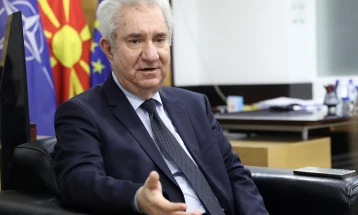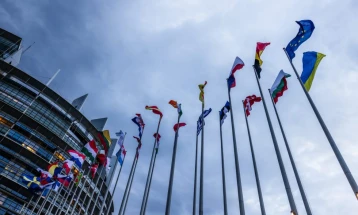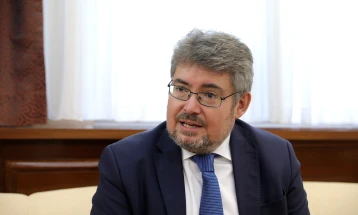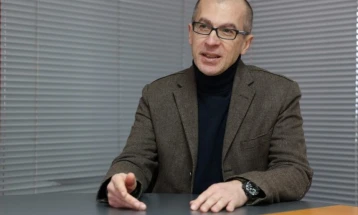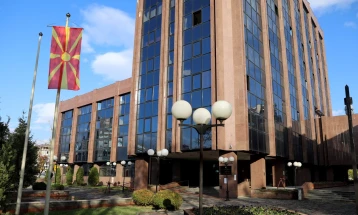European day of remembrance commemorates 1944 genocide of Sinti and Roma
- Friday, August 2 marks the European Holocaust Memorial Day for Sinti and Roma, commemorating the genocide of the ethnic minority Sinti and Roma people in the former Nazi concentration camp Auschwitz-Birkenau during the Second World War.
- Post By Angel Dimoski
- 11:26, 4 August, 2024
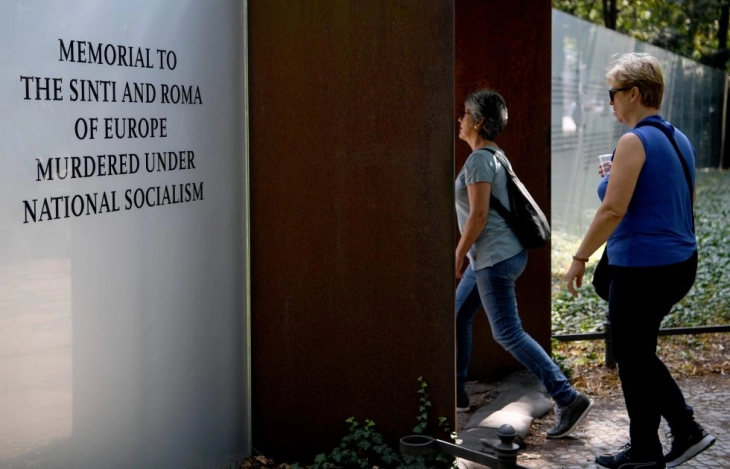
4 August 2024
enr - Brussels
Friday, August 2 marks the European Holocaust Memorial Day for Sinti and Roma, commemorating the genocide of the ethnic minority Sinti and Roma people in the former Nazi concentration camp Auschwitz-Birkenau during the Second World War.
On August 2, 1944, the last 4,300 Sinti and Roma at Auschwitz were murdered – despite a fierce revolt within the camp. The day of commemoration is dedicated to an estimated 250,000 to 500,000 Sinti and Roma who were murdered in Nazi-occupied Europe.
This year marks the 80th anniversary of the genocide. The day has been a European day of remembrance since 2015. In April that year, the European Parliament passed a resolution to formally recognise it as such.
The Roma are Europe’s largest ethnic minority, with an estimated total of ten to twelve million living in Europe – some six million of them in the European Union, according to Council of Europe data. As some Roma are traditionally nomadic, exact figures are unknown.
In EU terminology, Roma is an umbrella-term for ethnic minorities including Roma, Sinti and others, as well as “traveller” populations such as Gypsies. EU countries with a large share of Roma people include Romania, Bulgaria, Hungary, Spain, Slovakia and France.
While the commemoration of the genocide shows a symbolic recognition for Nazi victims, 80 years later persistent discrimination against the Roma and Sinti communities remains. The genocide is a source for trauma within the community which is still politically, socially and economically marginalised. Persons responsible for or involved have prevented it from being recognised for decades after the genocide.
“The history of the Gypsy people, both in Spain and in the rest of Europe, is a history of persecution, denial, and oblivion,” said José Vega from the Spanish Federation of Gypsy Women’s Associations (Fakali).
Troubled waters for Sinti and Roma across Europe
According to a survey conducted by the Vienna-based EU Fundamental Rights Agency (FRA) – which was carried out in 2021 in eight EU member states and two non-EU members – 80 percent of Roma are at risk of poverty, 52 percent suffer housing deprivation and 22 percent live in homes without running water.
In April 2024, the European Commission asked EU countries to “redouble their efforts” to combat the high levels of anti-gypsyism and discrimination suffered by the Roma population in Europe, and to guarantee their equal access to education, employment and health care.
In Spain, the government estimates there may be around 750,000 Roma in the country currently, according to sources from the Ministry of Social Rights. A majority is concentrated in Andalusia, the Valencian Community, Catalonia and the Community of Madrid.
In recent years there have been significant improvements for the Roma population, such as the law on equal treatment and non-discrimination and the reform of the Penal Code with the inclusion of anti-gypsyism as a hate crime – but access to housing and education remain among the great challenges.
In North Macedonia, Roma people are included in the constitution as one of the ethnic communities living in the country. There are several Roma parties and they have been included in all compositions of the multi-party parliament since 1990, with several past governments having Roma ministers.
However, Roma majority neighbourhoods in the country are located on the periphery of cities, are often poorly urbanised lacking the most basic urban needs, and have to endure substandard conditions. According to research by the United Nations International Children’s Emergency Fund (UNICEF) and the World Bank, around 30 percent of the Roma population in North Macedonia lives in prefabricated buildings, and most Roma neighbourhoods have unpaved streets, no street lighting, and no kindergartens, schools, or medical clinics.
A UN report assessed that in North Macedonia, existing laws for the protection of human rights and against discrimination are not effective. Cases of young Roma people not being allowed into cafés, clubs and pools, experiencing harassment from police officers, as well as discriminatory treatment in courts are highlighted as examples of direct and indirect cases of discrimination.
For neighbouring Serbia, the European Commission Against Racism and Intolerance (ECRI) said in June that the country must do more to tackle discrimination of the Roma and LGTBQ communities and counter hate speech. “Hate speech against Roma and other ethnic minorities, LGBTI communities and refugees/migrants is persisting in political and other public discourse,” added the Council of Europe mandated body, using an alternative acronym to describe the queer community.
In Austria, Roma live mainly in the eastern state of the Burgenland, but also in larger cities such as Vienna and Graz. People across Austria still express racist prejudices or believe that they themselves are to blame for attacks and violence against them. According to Austrian historian Stefan Benedik, there is also racism that refers to the Nazi era, with graffiti all over Austria bearing slogans such as “Roma to the concentration camp”.
In Slovenia, Roma people live in larger communities mainly in the eastern and south-eastern parts of the country. They have a special status under the country’s constitution and enjoy special rights that allow them to preserve and develop their culture, language and heritage. They have representatives on local councils in the communities they live in. A specific law on the Roma community was adopted in 2007, and there is a national programme of measures to benefit the Roma, which relies heavily on EU funding.
However, poor socio-economic status and housing conditions, low participation in education, unemployment, the isolation of some Roma communities and the persistent prejudice of the majority population against Roma continue to hinder their integration. Local authorities in the southeast of Slovenia believe that the state is doing too little to curb the violence and crime caused by some Roma.
In Bulgaria, on May 30 the National Council for Cooperation on Ethnic and Integration Issues with the Council of Ministers approved a monitoring report on the implementation of Bulgaria’s National Strategy for Roma Equality, Inclusion and Participation for 2021 to 2030. One step towards a successful Roma inclusion and integration, taken in 2023, was the regulatory setting of targeted funding for the appointment of educational mediators, social workers and assistant teachers, the report said.
However, Amnesty International had published its annual State of the World’s Human Rights report the month before, which criticised Bulgaria for racial discrimination in denying Roma access to public swimming pools.

(Social) media fuels hate speech, disinformation
In some countries, such as Italy and Bulgaria, the media reinforce harmful attitudes and prejudices towards Roma, despite the existence of laws and codes of ethics that prohibit hate speech and discrimination. These are the findings of a study funded by the Council of Europe and the European Union in June.
In Italy, the media often selectively represent “Roma as subjects or objects in reports of minor crimes, domestic violence and social disputes involving Roma communities near local neighbourhoods”, the study says. “Such portrayals contribute to negative stereotypes, presenting Roma as ‘clan’ people who are irresponsible, particularly regarding childcare and the treatment of women within their families.”
In July, the Bulgarian NGO Amalipe Centre for Interethnic Dialogue and Tolerance released a report, according to which false information about healthcare and politics influenced the Roma community in the country. The analysis conducted between February and May 2024 revealed that social media is actively used to target the community with anti-vaccination and anti-Semitic propaganda.
New Holocaust research consortium in the works
If approved by the European Commission, the Netherlands will become the host of an international Holocaust research agency. The idea is that participating countries in the consortium – the Netherlands, Belgium, Germany, Israel, Croatia, Austria, Poland, Romania, Slovakia, the Czech Republic and the United Kingdom – pool information, including photos, videos, paper and digital archives.
Although there is a lot of information on the Holocaust, it is currently “scattered among thousands of archives, libraries, museums and other institutions”. This fragmentation, – according to the Dutch Minister of Education, Culture and Science, Eppo Bruins, and Vincent Karremans, who is the state secretary responsible for war remembrance – makes it difficult for researchers to find all the necessary information. This is what the research office should try to solve.
Photo: enr/MIA Archive


